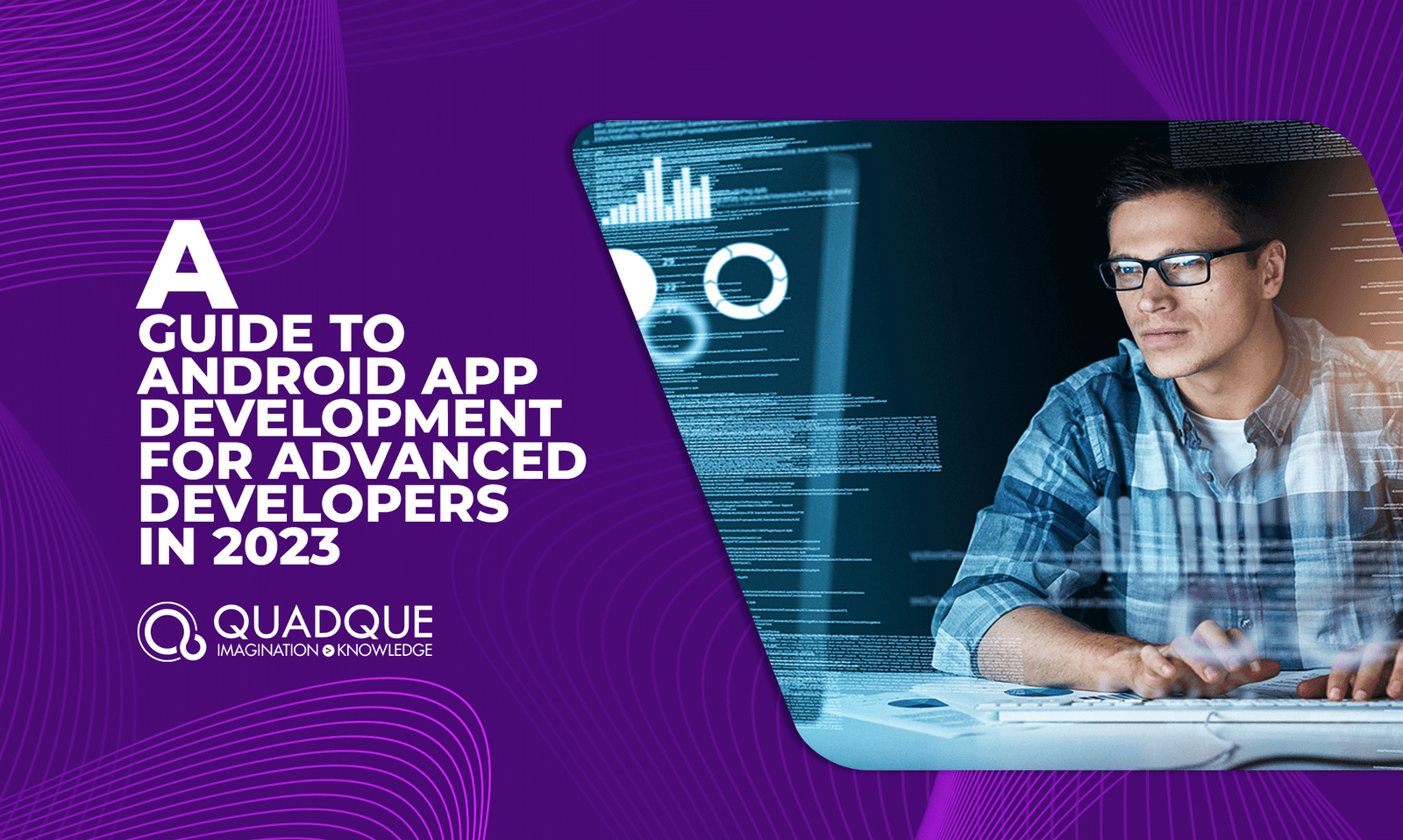
Learn more about advanced Android app development concepts
Do you already have some experience building Android apps and want to take your skills to the next level?
We are here to provide you with a guide. By the end of our guide, you will have a deep understanding of advanced Android app development concepts and can try building complex apps with advanced features. So let’s take a look!
A Guide to Advanced Android App Development
Let’s take a look at the main topics that you need to study for advanced Android app development.
1. A Recap of the Basics of Android Development:
Before delving into the advanced topics, go over the fundamentals of Android. Take a quick look at the basics of Activities, Intents and Views. It’s also a good idea to familiarise yourself with Android Studio and the Android SDK. Make sure that you also have a good understanding of the app development process.
Summary: Review the basics of Android, including basic components like Activities, Intents and Views. Familiarise yourself with Android Studio and the Android SDK. Review the Android app development process
2. Advanced Topics in Android Development:
One of the primary steps is to learn more about the advanced topics that you have to master along the way. We highly suggest getting yourself introduced to the basic idea of these advanced topics, such as Material Design, device hardware, background services and complex features.
Summary: Get introduced to advanced Android development topics like Material Design, access to device hardware and background services. Learn how these topics can take your Android app development skills to the next level. Explore how these topics can be combined to create more complex, feature-rich Android apps
3. Material Design:
Understanding the principles of material design is crucial for creating an intuitive user experience. So you need to know how to use the Google guidelines and tools. This can be difficult for those who have little experience with typography, colours and other design features. So you can take tips from an expert UI/EX designer.
Summary: Understand the material design principles and their impact on the user experience. Learn how to implement Material Design in an Android app using guidelines and tools provided by Google. Learn about the best practices for Material Design, including proper use of typography, colours and animations
4. Access to Device Hardware:
Knowing how to utilise the hardware components is just as important as knowing the software components. Therefore, you should have a clear understanding of the device’s sensors and camera technology. Always remember that different devices have different hardware capabilities. So don’t forget to stay up to date.
Summary: Understand how to access device hardware, including the camera, sensors and other components. Learn how to implement camera access in an Android app using the Camera API. Learn how to implement access to sensors (accelerometer, gyroscope and other sensors) in an Android app using the Sensor API
5. Background Services:
Background services are often overlooked in the app development process. This can lead to significant performance issues in the long run. So learn more about the foreground and scheduled services. Take your time to learn how to avoid memory leaks and battery drain during app development.
Summary: Understand the importance of background services in Android app development. Learn how to implement background services in Android, including foreground services and scheduled services. Learn about the best practices for Android background services, such as avoiding memory leaks and battery drain
6. Location-based Services: Location-based technologies like GPS and geofencing are widely used in many popular apps today. So it’s an advanced topic that you should take very seriously. Study different topics such as location tracking, the Fused Location Provider API and the Geofencing API. Mastering these topics will help you to utilize location-based services effectively.
Summary: Understand location-based services in Android, including GPS and geofencing. Learn how to implement location tracking in an Android app using the Fused Location Provider API. Learn how to implement geofencing in an Android app using the Geofencing API
7. AsyncTask and Multithreading:
There are various challenges to managing multiple threads on Android. So you should understand its basics and learn how to use threads and handlers. You should also learn about multithreading, the various benefits of using AsyncTask and how to implement this tool in the application.
Summary: Understand the basics of multithreading in Android and the challenges of managing multiple threads. Learn how to implement multithreading using threads and handlers. Understand the benefits of AsyncTask for background tasks and implementing it in an Android app
8. Networking and Web Services:
Knowing the basics of networking is crucial before moving on to the more advanced topics in this step. So get yourself habituated to making API calls. Then, you can learn about parsing JSON and XML data using different libraries. We also suggest learning about network errors and handling them.
Summary: Understand the basics of networking in Android and how to make REST API calls. Learn about parsing JSON and XML data in Android using popular libraries like GSON and XmlPullParser. Learn how to handle network errors and implement proper error handling in Android apps
9. Advanced Database Operations:
The next step consists of advanced database operations. You should have a solid concept of migrations and query optimization. You should also learn how to use libraries like Room and SQLiteOpenHelper. There are certain best practices for database operations that you need to master as well.
Summary: Understand advanced database operations in Android, including migrations and query optimization. Learn how to implement database migrations in Android using popular libraries like Room and SQLiteOpenHelper. Learn about the best practices for database operations in Android, including proper use of transactions and indexes
10. Testing on Android:
Testing can be classified into different types, including unit testing and instrumentation testing. It’s best to study both types for the best possible results. You can start by experimenting with Junit and Mockito. For instrumentation testing, you can take a look at Espresso and UI Automator.
Summary: Understand the importance of testing in Android app development. Learn how to implement unit testing in Android using JUnit and Mockito. Learn how to implement instrumentation testing in Android using Espresso and UI Automator
11. Android Performance Optimization:
Performance optimization is necessary for running an app efficiently and effectively over the long term. So you should focus on practices like reducing memory usage and improving the startup time. You can also measure and improve the performance of the app using several tools.
Summary: Understand the importance of performance optimization in Android app development. Learn about the best practices for performance optimization, including reducing memory usage and improving app start-up time. Learn how to measure and improve the performance of Android apps using tools like Android Profiler and Traceview
12. Deployment and Continuous Integration:
The last step consists of learning how to deploy the apps. After deployment, you also should know how to integrate the app and improve its visibility. There are numerous tools and techniques that you can use to achieve this goal. So take your time to study these techniques and processes.
Summary: Learn how to deploy Android apps on different platforms, like iOS and the web, using cross-platform development frameworks like React Native and Flutter. Learn how to implement continuous integration using tools like CircleCI and Jenkins for automated testing and deployment. Learn about the best practices for app store optimization to improve app visibility and downloads
Conclusion
Last but not least, you should place a great emphasis on the importance of continuous learning to keep up with the latest trends and technologies. We also encourage you to explore more advanced topics and take your app development skills to the next level. It’s quite easy to master advanced app development skills with the right approach.
Recent Posts
- Custom Software’s Role in Shaping Tomorrow’s Tech Landscape
- Breaking Down SEO Trends in 2024: Techniques You Need to Know
- Education in USA: Public vs. Private Schools and Their Impact
- Australia’s Tech Titans: The Top Software Companies Down Under
- Inside the Digital Landscape: Australia’s Trailblazing Software Innovators
Recent Comments
Latest Post
Categories
- AI
- Biometric
- Blockchain
- Cloud Computing
- CRM
- custom software
- Cybersecurity
- Data Analysis
- Datacenter Management
- Designer
- Digital Marketing
- Education
- Informative
- ISP Management
- IT Procurement
- IT Recruitment
- IT Support
- Mobile App
- Network Management
- Robotics Landscape
- SAP ERP
- SEO
- Structured Cabling
- Tech Australia
- Tech bangladesh
- Technology
- Web Development


